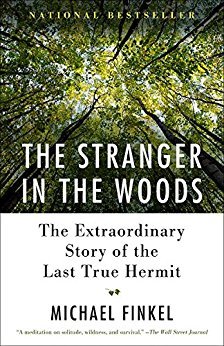More on this book
Community
Kindle Notes & Highlights
Read between
May 23 - June 18, 2023
One’s desire to be alone, biologists have found, is partially genetic and to some degree measurable. If you have low levels of the pituitary peptide oxytocin—sometimes called the master chemical of sociability—and high quantities of the hormone vasopressin, which may suppress your need for affection, you tend to require fewer interpersonal relationships.
The Tao Te Ching says that it is only through retreat rather than pursuit, through inaction rather than action, that we acquire wisdom.
“Not till we have lost the world,” wrote Thoreau, “do we begin to find ourselves.”
In appropriate doses, worry was useful, possibly lifesaving. “I used worry to encourage thought,” he said. “Worry can give you an extra prod to survive and plan. And I had to plan.”
And anyway, when was a journal ever honest? “It either tells a lot of truths to cover a single lie,” he said, “or a lot of lies to cover a single truth.”
He was never once bored. He wasn’t sure, he said, that he even understood the concept of boredom. It applied only to people who felt they had to be doing something all the time, which from what he’d observed was most people. Hermits of ancient China had understood that wu wei, “non-doing,” was an essential part of life, and Knight believes there isn’t nearly enough nothing in the world anymore.
Nature, Knight clarified, is brutal. The weak do not survive, and neither do the strong. Life is a constant, merciless fight that everyone loses.
According to more than a dozen studies conducted around the world, Knight’s camp—an oasis of natural quiet—may have been the ideal setting to encourage maximal brain function. These studies, examining the difference between living in a calm place and existing amid commotion, all arrived at the same conclusion: noise and distraction are toxic.
You don’t need that much quiet to change things, or even have to be alone. But you do have to seek out a soothing environment, and you must do it often. Japanese researchers at Chiba University found that a daily fifteen-minute walk in the woods caused significant decreases in cortisol, along with a modest drop in blood pressure and heart rate. Physiologists believe our bodies relax in hushed natural surroundings because we evolved there; our senses matured in grasslands and woods, and remain calibrated to them.
Studies of humans in the United States, Great Britain, Holland, and Canada have shown that after passing time in quiet, rural settings, subjects were calmer and more perceptive, less depressed and anxious, with improved cognition and a stronger memory. Time amid the silence of nature, in other words, makes you smarter.
The Indian writer Jiddu Krishnamurti has been quoted as saying, “It is no measure of health to be well adjusted to a profoundly sick society.”
Isolation is the raw material of greatness; being alone is hazardous to our health. Few other conditions produce such diametrically opposing reactions, though of course genius and craziness often share a fence line.
Thomas Merton, the Trappist monk, wrote that nothing can be expressed about solitude “that has not already been said better by the wind in the pine trees.”
What happened to him in the woods, Knight claimed, was inexplicable. But he agreed to set aside his fear of phony wisdom and koans and give it a try. “It’s complicated,” he said. “Solitude bestows an increase in something valuable. I can’t dismiss that idea. Solitude increased my perception. But here’s the tricky thing: when I applied my increased perception to myself, I lost my identity. There was no audience, no one to perform for. There was no need to define myself. I became irrelevant.”
“All distances, all measures,” wrote Rainer Maria Rilke, “change for the person who becomes solitary.”
In an attempt to gain some empirical understanding of solitude, a cognitive neuroscientist at New York University placed more than twenty Buddhist monks and nuns inside magnetic resonance imaging machines, tracking blood flow to their brains while they meditated. Other neuroscientists conducted similar studies. The results remain preliminary, but it appears that when the human brain experiences a self-consciously chosen silence, as opposed to sleep, the brain does not slow down. It remains as active as ever. What changes is where the brain is functioning. Language and hearing are seated in the
...more
Silence, it appears, is not the opposite of sound. It is another world altogether, literally offering a deeper level of thought, a journey to the bedrock of the self.
There was no place for him, and instead of suffering further, he escaped. It wasn’t so much a protest as a quest; he was like a refugee from the human race. The forest offered him shelter.
But life isn’t about searching endlessly to find what’s missing; it’s about learning to live with the missing parts.
Modern life seems set up so that we can avoid loneliness at all costs, but maybe it’s worthwhile to face it occasionally. The further we push aloneness away, the less are we able to cope with it, and the more terrifying it gets. Some philosophers believe that loneliness is the only true feeling there is. We live orphaned on a tiny rock in the immense vastness of space, with no hint of even the simplest form of life anywhere around us for billions upon billions of miles, alone beyond all imagining. We live locked in our own heads and can never entirely know the experience of another person.
...more
“Solitude is the profoundest fact of the human condition,” wrote the Mexican poet and Nobel laureate Octavio Paz.
“Ultimately, and precisely in the deepest and most important matters, we are unspeakably alone,” wrote the Austro-German poet Rainer Maria Rilke.


